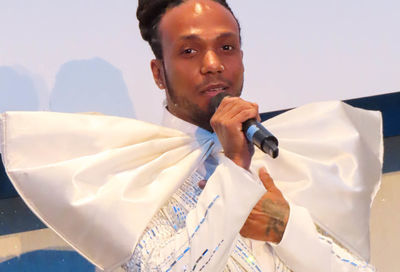Ashley Hoff Digs Into the Making of ‘Mommie Dearest’
Ashley Hoff spins his fascination with a camp classic into a page-turning book on its making in "With Love, Mommie Dearest."

Arriving, appropriately enough, in the wake of Mother’s Day, comes a new book toasting the mother of all Bad Mother movies, Mommie Dearest.
Ashley Hoff’s With Love, Mommie Dearest: The Making of an Unintentional Camp Classic offers chapter after entertaining chapter digging into the making of the notorious 1981 drama starring Faye Dunaway, tearing down rose bushes, bearing walls, and some of the scenery as Hollywood film legend Joan Crawford.
Based on the eponymous best-selling memoir by Christina Crawford, Joan’s adopted daughter, detailing years of emotional and physical abuse at the hands of her Oscar-winning mother, Mommie Dearest was supposed to be a serious exposé of child abuse. Somehow, that’s not the movie that director Frank Perry and producer Frank Yablans wound up making, as is vividly chronicled in Hoff’s book.
“Nobody sets out to make a failure,” says the author and Hollywood historian, whose previous book Match Game 101: A Backstage History of Match Game took a behind-the-scenes look at a different camp phenomenon. Hoff also published My Huckleberry Friend: Holly Golightly and the Untold History of Breakfast at Tiffany’s, about another book-to-film adaptation that was, by all accounts, better received. Yet, clearly, as Hoff writes, the Mommie Dearest filmmakers thought they had a hit on their hands.
“It had everything going for it,” says Hoff. “It was based on a bestselling memoir. It was an A-list picture with an A-list star, A-list director, studio budget, top-flight set and costume design. It’s a beautiful film to look at, but sadly, for the reasons I detail in the book, it was not received as it was intended, and a lot of people were very hurt by that.”
Probably first among those hurt was Christina Crawford. “Clearly, she does not like the film,” says Hoff, who met Crawford at an event years ago, where they briefly discussed the movie based on her life.
“At the time, she had acknowledged the fact that, at the very least, the movie did help usher in, along with her memoir, the conversations about abuse, how to get beyond it, making clear distinctions between simply disciplining your child, and, frankly, taking out on your kid the fact that you had a rotten day at work or whatever the root causes are.”
Though Christina Crawford wasn’t interviewed for With Love, Mommie Dearest, she and Hoff did exchange emails. “She simply reiterated her disappointment that the film could have been a groundbreaking movie that seriously presented this topic. She’s dissatisfied with the result, but she’s had four decades to recognize it for what it is. And I’m very respectful of that.”
With Love, Mommie Dearest is plenty respectful of Dunaway, who only took on the role after Anne Bancroft, the actress originally cast as Joan Crawford, departed the project. (Bancroft’s husband Mel Brooks is credited with dissuading her from taking the part, providing a great story in the book.)
“I don’t think most people watching Mommie Dearest, even when they’re laughing, are necessarily ridiculing Faye Dunaway’s performance,” Hoff says. “I think they’re enjoying the hell out of it…. I think it really is a fabulous performance. She’s a powerhouse star.”
But Dunaway has spent the past forty years trying to distance herself from Mommie Dearest. As far as Hoff is concerned, it will always be part of her cinema legacy, and deservedly so. “The fact that we’re still talking about it four decades on proves that. In fact, the one thing I would say I learned through the writing of this book is that it has made me rethink my definitions of the words success and failure,” he says.
“This movie has long been regarded as a critical failure and called a flop, a cinematic bomb. And the truth of the matter is, while loftier award-winning films made the same year have sunk completely out of sight, this movie lives on and is, in fact, cherished and beloved. We should all fail as successfully as Mommie Dearest.”
With Love, Mommie Dearest: The Making of an Unintentional Camp Classic (Chicago Review Press, $19.99) is available at online booksellers, including www.Amazon.com, or directly from www.chicagoreviewpress.com.
Support Metro Weekly’s Journalism
These are challenging times for news organizations. And yet it’s crucial we stay active and provide vital resources and information to both our local readers and the world. So won’t you please take a moment and consider supporting Metro Weekly with a membership? For as little as $5 a month, you can help ensure Metro Weekly magazine and MetroWeekly.com remain free, viable resources as we provide the best, most diverse, culturally-resonant LGBTQ coverage in both the D.C. region and around the world. Memberships come with exclusive perks and discounts, your own personal digital delivery of each week’s magazine (and an archive), access to our Member's Lounge when it launches this fall, and exclusive members-only items like Metro Weekly Membership Mugs and Tote Bags! Check out all our membership levels here and please join us today!


























You must be logged in to post a comment.